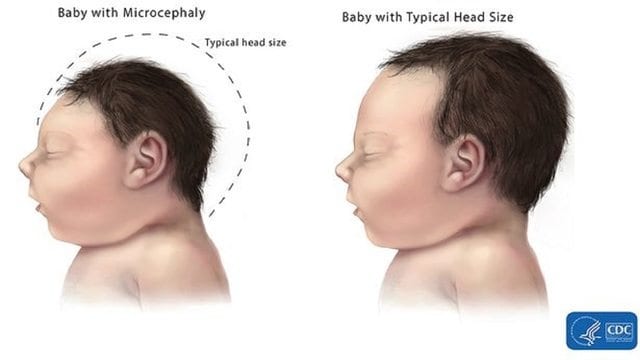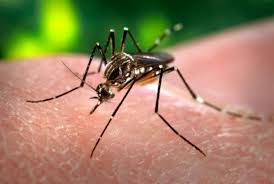
The Zika virus is the newest developing medical ailment to cause mass hysteria in most of the western hemisphere. The virus has been spreading rapidly since early 2015. Occurring simultaneously with the spread of the Zika virus is an epidemic of birth defects. Newborns in some South and Latin American countries have been born with noticeably smaller or deformed craniums, otherwise known as congenital microcephaly. As a result of the defect, the babies are also born with partial brain development. The two medical singularities are being separately investigated, but many believe that the two are related.
Many are pointing to the Zika virus, claiming that the virus is effecting pregnant women or women who plan to bear children. While many believe that the Zika virus is the direct cause of the deformity, scientists are still evaluating a causal link. A group called Doctors in a Crop-Sprayed Town from Argentina and Brazil have a different idea. They are claiming that the Zika virus is not what caused the deformity. They are claiming that a chemical is to blame.
Information about the Zika virus, its effects, and transmissions often vary because the increased deformities are a developing new health trend. Scientists and doctors are still investigating both phenomena which makes it difficult for those living in affected areas and around the world to receive accurate information.
What is the Zika Virus?

The Zika virus is a disease transmitted mostly through the bite of a mosquito. The virus will typically only cause a rash, fever, pain at the sight, or irritated eyes. The disease is not fatal. The Center for Disease control state that only 1 in 5 people infected will fall ill from it. The mosquito will bite one individual who is infected which will spread the disease to another when they bite them. The disease will stay in the blood for about a week. There have been reports that unprotected sexual contact and blood transfusions have also caused the spread of the virus.
As of now, there are no means to prevent or treat the virus besides avoiding mosquito bites or transmission from an infected individual.
Apparent Link to Birth Defects

The CDC is currently studying the effects of the Zika virus on pregnancies. They insist that pregnant mothers will rarely pass the disease onto the unborn child, but they can’t confirm that it will not happen while the fetus is in utero without further investigation. Like other blood borne diseases, transmission can be prevented through proper care during birth. So far, there has been no reports that breastfeeding has spread the disease to the nursing infants.
The CDC advises that women who are pregnant or want to become pregnant, stay away from areas prone to the virus until more solid information becomes available.
Global activists are calling for increased review of the socio-economic allocation of resources and education practices of most of the affected area. Some argue that women and families in poorer areas are at a disadvantage because they lack access to safe healthcare. Due to the predominance of Catholicism in the effected areas, some argue that the spread of the virus through unprotected sexual contact is increasing thanks to the Catholic belief against the use or education of contraception.
A Different Theory

Contrary to popular opinions, some individuals are not as convinced that the cranial deformities are caused directly by the spread of the Zika virus. The Doctors in a Crop-Sprayed Town argue that the deformities come from a man-made chemical called Pyriproxyfen. This chemical is the product of a Japanese chemical company.
In 2014, Brazil was facing a growing mosquito epidemic. A large amount of mosquito larvae was laid in standing water across the country. In an effort to prevent increased populations of mosquitoes, Brazil added the chemical to its drinking water supplies. The doctors claim that this is what is causing the increase of cranial deformities in many parts of southern America.
In order to support their claims, the doctors have cited that many recently pregnant women who have the Zika virus have not given birth to children with congenital microcephaly. As further evidence, the organization points to other countries with massive Zika outbreaks in South America where there has been no increase in the birth defect, like Columbia.
Meanwhile, Argentina’s Minister of Health has affirmed the countries’ belief that the Zika virus outbreak is to blame for the recent influx of birth defects.
What to Do Now
The proof of the effects of the Zika virus on pregnancy are still developing. Traveling to the South and Latin America is currently been said to be ill-advised. There are a few reported cases of the Zika virus infecting North American citizens who recently traveled to the affected areas and brought it back.
The areas affected are currently undergoing increased measures to eliminate populations of mosquitoes and stop the spread of the Zika virus. Countries have been spraying the areas with chemicals and adding more chemicals, including Pyriproxyfen, to the drinking water.
Until the CDC and other global health entities find more conclusive connections, it is advised to stay away from affected areas and avoid unprotected contact with affected individuals. If you are worried about getting pregnant or are pregnant and you may be infected, the CDC urges you to contact your health care provider to discuss precautions that can be taken.
[adinserter block=”2″]
[adinserter block=”7″]